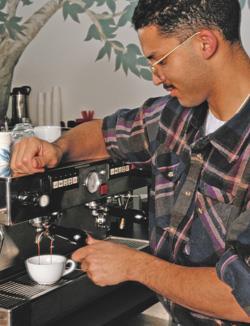Espresso coffee. The science of quality
Espresso coffee. The science of quality
Andrea Illy and Rinantonio Viani
London, UK: Elsevier Academic Press | 2005 | 398pp | ?49.99 (HB) | ISBN 0123703719
Reviewed by Tony Stubbings
As you relax after your Christmas lunch with a fine cup of espresso coffee, spare a thought for all the science that goes into that sensual pleasure.

For the best experience, one needs to start with good quality beans containing the optimum proportion of flavour chemicals. Then the roasting needs to be done at just the right temperature and stopped at the correct time when the aroma has fully developed.
Lastly, and most importantly, the extraction process with its final espresso percolation stage needs to be done according to scientific principles. An espresso machine needs to keep a portion of ground coffee in the form of a compact cake inside a container that allows the brew to drip out while holding back the particles (spent grounds). The machine also needs to heat the water to a temperature close to 90?C and to apply a pressure customarily fixed at nine relative atmospheres.
This book goes through each of these stages to explain the science. The plant and its genetics, the picking and processing of the beans, decaffeination, the alkaloids and other chemicals in raw coffee, the temperature distribution in coffee beans during roasting, physical and chemical changes in roasted coffee during storage, and a mathematical model for the espresso brewing process are all discussed in detail by a team of international coffee experts. I never knew there was so much science involved - for example about 300 volatile substances have been identified in green coffee beans and an additional 650 volatiles develop during roasting.
The book ends with a chapter on health issues relating to coffee consumption. Much has been published on this subject and a variety of views persist, but the authors correctly point out that coffee is more than the caffeine on which over 90 per cent of the research has been carried out. Further research is needed on the benefits and risks of coffee consumption. Whatever the results, most of us will keep on drinking it!












No comments yet